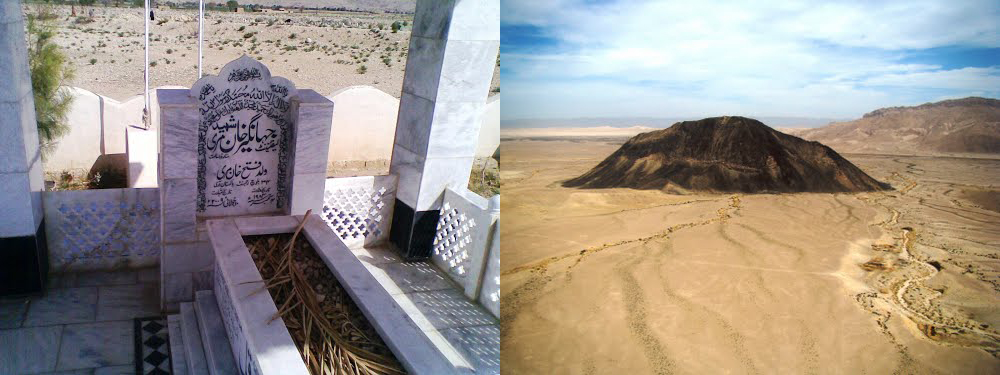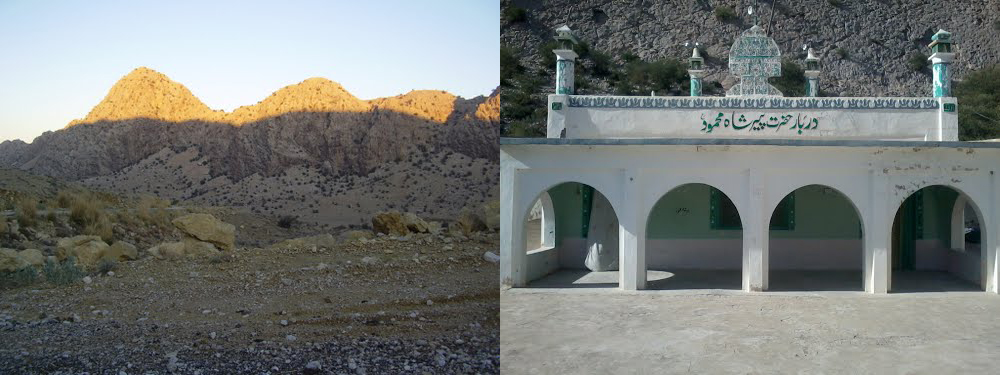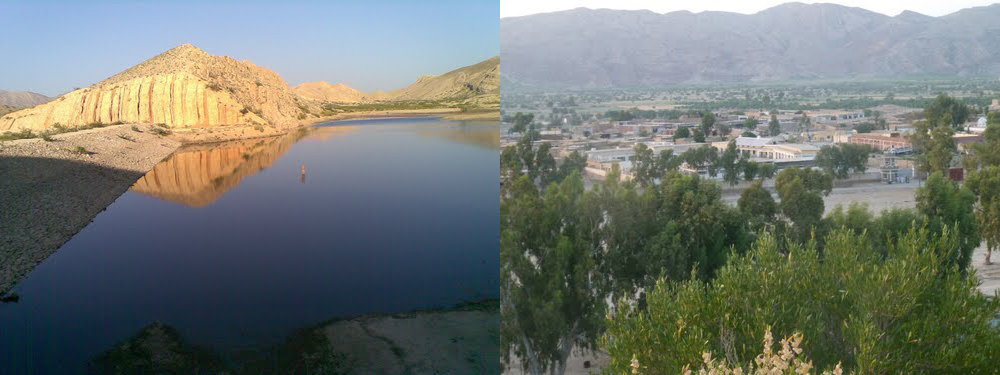Kohlu is a district of the Balochistan province of Pakistan. It is bounded in the north by Loralai District, Dera Bugti in the south, in the east Rojhan-Mazari and Sibi District in the west. Kohlu District covers 7,456 square miles (19,310 km2) and according to the 1998 census of Pakistan had a population of 196,000.
Kohlu, also known as Marri country, has always been an arena of political insurgence or tribal vendettas. It was a deserted area and there was no permanent human settlement before inhabitation of Marris in this area. That is the reason that the history of Kohlu district is primarily a history of the Marri tribe. However, Kohlu town and its surroundings have been predominantly occupied by Zarkoons.
It is said that in early times Kalmati Kupcháni and other Baloch tribes roamed this land. Mir Chakar Khan, the Rind hero of Baloch romance, is the person from whom history of this area starts. After his quarrels with Lasharis and his expulsion from Sibi, he took refuge in this area. After some time he migrated to the east of Indus along with his tribe but a small section of Puzh Rinds opted to stay in this area under the leadership of Bijar Khan. He had with him Ali Khan, Mando Khan and Khalu Khan, Rinds, a blacksmith (lohar), a gardener called Kangra, and a negro named Shaheja. These men founded the Marri tribe in the first quarter of the sixteenth century. The Bijarani clan was founded by Bijar Khan, the Loharani by the blacksmith and the Ghazani by Gazzo or Ghazan, a Buledi boy adopted by Ali Khan. These small groups gradually increased and began a career of raiding and conquest, but later on as their strength became constantly lessened by raids and incursions it became necessary to recruit from outside. Thus Brahuis, Balochs from other parts of Balochistan, Khetrans, Afghans and Jats gained easy admission to the tribe. There were many blood feuds and tribal wars in which the Marri tribesmen were killed. An easy admission to Marri tribe helped the tribe to maintain its strength.
The other remarkable tribe in Kohlu is the Zarkoon tribe. This tribe was once forced by the Bugti tribe to desert Kohlu but later Marris offered them a defensive and offensive alliance. According to a treaty the area surrounding Kohlu town was given to the Zarkoons.
It is claimed that the Marris were subjects of the Khan of Kalat and it was after the death of Mir Nasir Khan I that the Marris felt themselves free of any control. They started devastation in all directions and got engaged in wars and blood feuds with different tribes.
The Marri tribe gave much trouble to the British government and kept on attacking the British interests. The British army occupied Kahan in May 1840 but shortly afterwards they were forced by the Marris to evacuate the place. On and off the British authorities signed treaties with the Marris but the law and order situation could not be improved. The Marris always thought the British as illegal occupants of their territory. Thus everything related to the British – men, allies or installations – was supposed to be attacked. In 1898 AD, Sardar Khair Bakhsh Khan Marri along with many of his tribesmen migrated to Kabul as a protest against the British occupation. However they came back after some time unconditionally.
After the Indo-Pak partition, this area remained a political agency. The tribal leadership started voicing for unity of Baloch tribes and an independent Balochistan. Nationalist sentiments grew rapidly and after the arrest of the Khan of Kalat in 1958 the tribesmen started a guerrilla – although on limited scale – against the government. The army was sent to control the movement but its presence further deteriorated the situation. Mir Sher Muhammad Marri took the leadership of the movement which was called ‘farrari movement’. This movement ended in 1969.
After the dismissal of the first elected government of Balochistan in 1973, a serious conflict started between the government and the political leadership of the province. While responding to the situation, the tribesmen in Kohlu started a large scale insurgence in the area and after a strong military operation they migrated to Afghanistan along with their leaders. Coincidentally, the history repeated itself and Sardar Khair Bakhsh Khan Marri (Chief of Marris now-a-days) went into voluntary self-exile and reached Kabul in 1981.
Since the up-rising in Kohlu the presence of military forces has been considered necessary to keep the situation in control. However, the government made many efforts to develop rapport among the tribesmen. Various incentives and concessions have been awarded to the local elders. Although the Marris returned back from Afghanistan in 1991 responding to an appeal by the Pakistani government, the political situation still cannot be called satisfactory. Development activities are still hard to be carried out independently of tribal elders. The tribal-political leadership is of the view that the land of Kohlu district is communal property of the Marri tribe. Thus before exploiting any natural resource, the government should negotiate with the tribal elders. However, this and some other issues have resulted in internal dissension and the Bijarani clan has opted its own stand point. The law and order situation is not satisfactory. This is evident from an attempt by the Bijarani tribesmen to occupy the district headquarters in 1997.
Kohlu was given the status of district on 6th February 1974 and reshaped in July 1983. At present the district is comprised of three sub-divisions – Kohlu, Mawand and Kahan – with its headquarters at Kohlu.
The shrine of Mast Tawakali at Maidan Gari near Kohlu is a place of interest in the district.


